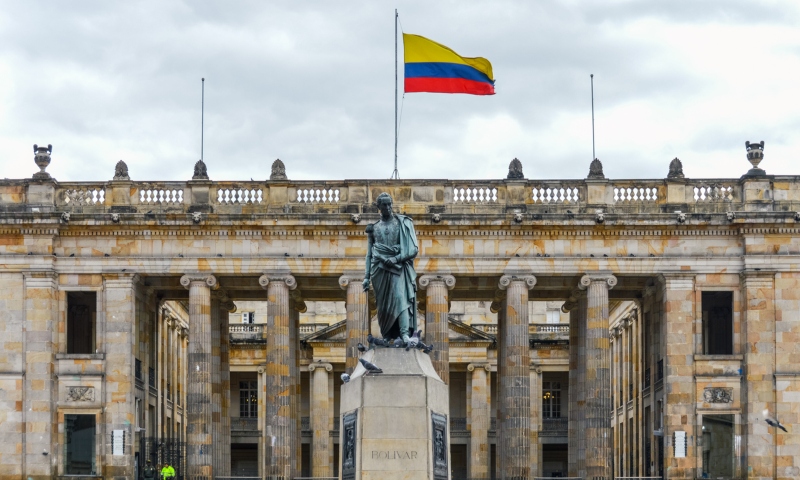Running on a platform of gender equity, progressive taxation, and environmental protection, Colombia’s first leftist president could bring much-needed change to a deeply unequal nation.
August 14, 2022 by Inequality

By Omar Ocampo
On June 19, the Colombian public elected Gustavo Petro and Francia Márquez as the nation’s first leftist president and Black vice president. To many, their historic victory symbolizes a potential end to a structural contradiction that has afflicted Colombia’s democracy for the past one hundred years: the paradoxical coexistence of a stable representative democracy and high levels of political repression and violence, particularly towards movements and parties working to build a more progressive and equal society.
One does not need to look very far into the past to find evidence of collective targeting of known political detractors. For example, over 4,000 activists, leaders, and presidential candidates of the first openly leftist and oppositional party, Unión Patriótica, were systematically assassinated after achieving some initial electoral success at the local and regional level in the mid-1980s. Supporters, too, were targeted. Civilians were forcibly displaced or killed by illegal armed groups with the explicit goal of violently reorganizing districts and municipalities to deny Unión Patriótica a local or regional base of support. Traditional political elites and their wealthy patrons made it clear that alternative political projects grounded in social justice were not to be tolerated even in a competitive democracy.
And while the threat of political violence has not ceased, analyst and current Colombian Senator Ariel Ávila recently remarked that the struggle to create a political space for the excluded and marginalized has resulted in the ascendancy of Petro and Márquez. As an Afro-Colombian environmental activist, Márquez and her connections to grassroots social movements increased Afro-Colombian and indigenous voter participation in the Pacific region of the country, ensuring a strong base of support for an egalitarian political program, that guaranteed their victory.
That a former activist and the son of farmers are now leading one of the most influential countries in Latin America is especially notable given the country’s deepening inequality. A report published by the Organization for Economic Cooperation and Development (OECD) in 2018 revealed that social mobility for low-income families in Colombia is extremely low. In fact, it is almost nonexistent. It takes the bottom 10 percent a mind-boggling eleven generations to even come close to the country’s mean income. If we define the length of a generation to be 25 years, it requires 275 years for a low-income family to enter the middle-class.
For perspective, Colombia declared its independence from Spain 212 years ago in 1810.
Current official government statistics look equally grim. Despite some economic growth in the last three quarters of 2021, the poverty rate, currently at 39.3 percent, is higher today than it was eight years ago. The country is also home to the most devalued currency in Latin America. The official Gini Index is 54.2, making Colombia one of the most unequal countries in the world. The UN’s World Food Programme, meanwhile, recently classified Colombia as a “hunger hotspot” with food insecurity now affecting 7.3 million Colombians and 1.1 million Venezuelan migrants.
It should come as no surprise then that the politics of change triumphed over the politics of continuity. What is needed now is a program that expands economic opportunities, increases access to state and social services, promotes social mobility, and improves the material conditions of the most vulnerable and working-class communities so they can live a dignified life.
Petro and Márquez’s domestic platform emphasizes the need to transition away from the current status quo of endemic inequality towards a society that is a guarantor of human rights and social justice. Redistribution of wealth and power is on the agenda, but as noted by Petro in his victory speech, wealth needs to be created for it to be equitably redistributed.
The commitment to close all inequality gaps – economic, gender, racial, and LGBTQ – will be institutionalized with the creation of Ministry of Equality. Petro and Márquez envision an institution ensures pay equity and empowers women-headed households by guaranteeing a basic income above the poverty line. They also propose to establish a National System of Care that recognizes, renumerates, and redistributes care work.
As gender parity is central to achieving transformational change, the Petro-Márquez administration also aims to ensure that women make up half of all political appointees at every level and every branch of government to democratize decision-making.
In an interview with Noticias Caracol. Vice President-elect Márquez highlighted how the traditional and national political class had forgotten or purposefully ignored the peripheral regions of the country. “My task is to guarantee the rights of those from the excluded and marginalized territories, to guarantee the rights of Afro-descendant, raizal, palenquera, and indigenous populations.” The government of change pledges to combat structural racism, to protect their economic and territorial rights, and preserve their native languages.
The Petro-Márquez platform also vows to implement progressive forms of taxation. They propose to increase the taxes of the 4,000 wealthiest individuals in the country, precisely directed at unproductive assets like vacant fertile land. According to Wealth-X’s database, there are currently 4,740 individuals with a net worth of at least $5 million USD in wealth. The combined wealth of this class in 2021 was $104.3 billion USD.
The triumph of Gustavo Petro and Francia Márquez provides Colombia with a unique and important opportunity to begin the process of reversing the country’s deep-rooted and multi-faceted inequalities. Their platform is ambitious, and it will undoubtedly face opposition in the Congress, but this only serves to highlight the necessity to organize and continue the work because the status quo will not up its privileges and ill-gotten gains on its own accord.
No comments:
Post a Comment